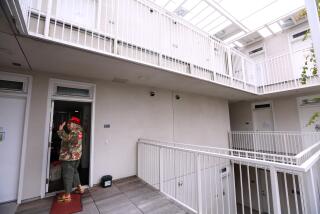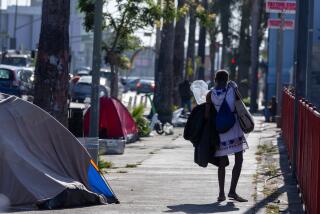Baldwin Park Cut Tax to Save Officials, Recall Leaders Say : RECALL: Leaders Say Tax Cut Was Timed to Protect Officials
BALDWIN PARK — Supporters of the recall effort against two City Council members say the decision two weeks ago to phase out a controversial utility tax was aimed at saving the jobs of the two officials.
Proponents of the ouster of Mayor Jack B. White and Councilman Leo W. King are angry that the council action came just six weeks before the recall election on March 31.
The recall campaign is based largely on opposition to the tax, which some residents have been fighting since it was imposed in 1985.
Although the tax was approved unanimously, White, King and the late Robert H. McNeill were singled out because they appeared to be leaders in advocating its passage, said Herschel Keyser, who led the petition drive that forced the recall election.
The tax phase-out is “just a ploy to get the people not to vote for the recall,” said Keyser.
But council members said that the Feb. 18 action to discontinue the tax over the next 21 months was taken because the city’s economic outlook is better than had been anticipated, and was not an attempt to sway voters.
“I’m sick and tired of people always looking for the political aspects of things,” said King, who has been on the council for 15 years.
White, who was first elected in 1978, said that “nobody liked (the tax). We passed it as a temporary measure. Now we are cutting it out because we can.”
The 5% tax on electricity, gas, water and telephone bills was imposed in August, 1985, to replace lost federal revenue-sharing funds.
The tax was reduced to 4% last year. Under the phase-out plan, the tax will be reduced to 3% this April, to 2% in January, 1988, and eliminated in November, 1988.
Since the tax was imposed, the city has raised about $1.4 million, said Michael R. Yelton, director of administrative services. The money has been used to replace $655,000 in lost federal revenue-sharing funds used by the Police Department and to hire six new police officers and raise salaries in the department.
King said the council had pledged to review the need for the tax twice every year. The action had nothing to do with the recall, he said.
City officials had originally estimated that at the end of this fiscal year, Baldwin Park would be $219,000 in the red. But a recent financial review estimated that the city will have a $434,000 surplus when the fiscal year ends on June 30.
Keyser said the reports showing the city in good financial condition support his group’s arguments against the utility tax.
“We knew all along that they were taking in more money than was necessary,” Keyser said.
Yelton said that making revenue projections a year in advance is an “inexact science. We always tend to be on the conservative side. If we make a mistake, the kind of mistake we’ve made now is an ideal mistake.”
But Frank Ramirez, president of the Baldwin Park Homeowners Group, called the council’s reasoning “propaganda.”
“They’re still keeping it until 1988,” said Ramirez, whose organization helped collect more than the 2,899 signatures needed to force the recall election. He likened the action to offering a “carrot to a rabbit or a donkey. They’re still getting 3% out of us.”
Both sides pointed out that even if the council had not acted, the tax would have had to be eliminated or approved by voters by Nov. 15, 1988, because of Proposition 62.
That measure, approved last year, requires that all taxes adopted after July 31, 1985, be eliminated or approved by voters by the November deadline.
“I’m not saying that we’re not going need it (utility tax revenues) any longer,” said Rick Gibson, who has been on the council for three years. “We may still need the money, but we have no other option.”
The recall campaign began early last year, when members of the Concerned Citizens for Better Government and the Baldwin Park Homeowners Group combined efforts to get petitions forcing a recall vote and a referendum on a controversial redevelopment project.
Homeowners were upset with the city’s Sierra Vista Redevelopment Project, which calls for the Community Redevelopment Agency to spend as much as $200 million to help finance commercial and industrial development along the San Bernardino Freeway. Residents feared their homes would be taken to make room for retail stores.
But voters approved the plan by a margin of 52% to 40% in November. The remaining 8% did not vote on the issue.
In the March 31 recall election, McNeill’s name will appear on the ballot, along with White and King. Under state election law, his name must remain on the ballot even though he died in December. The council has decided that McNeill’s position will be filled in a special election.
If White and King are recalled, their successors will be selected in a July election.
More to Read
Sign up for Essential California
The most important California stories and recommendations in your inbox every morning.
You may occasionally receive promotional content from the Los Angeles Times.










